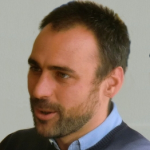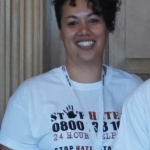Team
University of Trento – eCrime
-
Andrea Di Nicola
Associate professor in criminology at the Faculty of Law of the University of Trento, where he is currently teaching criminology and applied criminology. For over 20 years, he has been dealing with economic and organised criminality, urban security, environmental criminology and with the links between crime and the Internet. Since 1998, he has taken part in and supervised more than 50 international studies (for the European Commission and the European Parliament, for the Italian Ministry of Interior, of Justice and for Equal Opportunities). This experience enabled him to acquire specific competences in the realisation and management of complex studies employing quantitative and qualitative criminological research techniques. He has authored many publications, including articles, chapters and books. -
Mario Diani
Mario Diani is professor of Sociology at the University of Trento, that he joined in 2001 and where he served as head of the Department of Sociology and social research and as dean of the Faculty of Sociology. Earlier, he was Chair of Sociology at the University of Strathclyde in Glasgow (1996-2001), where he served as head of the Department of Government. Between 2010 and 2012 he was ICREA Research Professor in the Department of Political and Social Sciences, Universitat Pompeu Fabra, Barcelona. He has served on a number of editorial boards. His articles have appeared in several renewed journals such as American Sociological Review, American Journal of Sociology, Theory and Society, Social Networks, and Sociological Review. Recent or current research projects address network theories of social movements and collective action, social capital and multicultural democracy, global networks of mobilization on communication rights. -
Elisa Martini
Elisa Martini is a postdoctoral research fellow at the Department of Sociology and Social Research, University of Trento. She holds a M.A. in Sociology, and a Ph.D. in Sociology and Social Research from the Department of Sociology and Social Research, University of Trento. She is Teaching Assistant in Methodology and Techniques of Social Research at the University of Trento, she has been teaching Sociology at the University of Ferrara, and Visiting Scholar at the Department of Sociology, Utrecht University. She mainly deals with crime statistics, methodology of social research and migration studies. She has authored several publications including articles, chapters and books on youth deviance, social integration of second-generation migrants, pharmaceutical counterfeiting, trafficking in human beings, and smuggling of migrants. -
Gabriele Baratto
Gabriele Baratto is a research fellow at the Department “Faculty of Law” of the University of Trento – eCrime research group, where he is also co-owner of the courses “eCriminology” and “corporate security and brand protection”, and teaching assistant of the courses criminology and applied criminology. It deals mainly with the correlations between crime and the Internet (especially social media), organised crime, hate speech, counterfeiting and criminal markets, trafficking in human beings, smuggling in migrants and asylum seekers. He is currently also PhD candidate at the “School of International Studies” of the University of Trento. -
Daniela Andreatta
Research fellow at the Department “Faculty of Law” of the University of Trento and researcher at eCrime. In February 2019 she concluded the International PhD in Criminology at the Università Cattolica del Sacro Cuore di Milano with a project on the illegal management of waste. Her research interests mainly focus on environmental crime, organized crime, urban security, statistical analysis and crime spatial analysis.
Fondazione Bruno Kessler
-
Sara Tonelli
Sara Tonelli is the head of the Digital Humanities group at Fondazione Bruno Kessler (Trento, Italy). She defended her Phd in Language Sciences at Università Ca’ Foscari in 2010, and since then she has worked at FBK, first as a post-doc in the Human Language Technology group and then as a coordinator of the digital humanities activities. She has published more than sixty peer-reviewed papers in top-tier conferences and journals, and has been in a number of Program Committees. In 2016 she ha also been general co-chair of the Second Italian Conference on Computational Linguistics. Her main research interests focus on the semantic and discourse analysis of different types of texts including social media, travel narratives, news and political speeches. -
Marco Guerini
Marco Guerini is a researcher in computational linguistics at the HLT – Natural Language Processing unit of Fondazione Bruno Kessler (Trento, Italy). His research focuses on persuasive communication, sentiment analysis and social media. He graduated in Philosophy and received his Ph.D. in Information and Communication Technologies in March 2006 from the University of Trento. He is author of several scientific publications, published in top-level conference proceedings and international journals. His research work includes the participation in EU funded projects and program committee membership at international conferences. It has been featured on international magazines and newspapers, such as Wall Street Journal, MIT Technology Review, Harvard Business Review, Wired. In 2011, his activities have been partially funded by a Google Research Award, while in 2016 he received a research sponsorship from eBay. -
Rachele Sprugnoli
Rachele Sprugnoli is a researcher in the Digital Humanities group at Fondazione Bruno Kessler (Trento, Italy). She has both the bachelor’s and master’s degree in Humanities Computing at the University of Pisa and she has completed her PhD at the ICT Doctoral School of the University of Trento. Since 2005, she has been involved in Human Language Technologies projects specializing in corpus creation, text and speech annotation and use of crowdsourcing techniques for Natural Language Processing tasks. Currently, her research is focused on how computational methods and technologies can be applied to the treatment of cultural content, in particular of historical texts. -
Serra Sinem Tekiroglu
Serra Sinem Tekiroglu is a PhD Student in human language technologies at the HLT – Natural Language Processing unit of Fondazione Bruno Kessler (Trento, Italy), in collaboration with the Information and Communication Technology (ICT) Department of the International Doctoral School at University of Trento. She is currently working on utilizing perceptual elements in language on computational linguistics applications. She got my BSc Degree in Computer Engineering and MSc Degree in Software Engineering from Middle East Technical University, Turkey. She worked at AGMLab (Turkey) on semantic web and data mining, especially in search and recommendation engines. During her MSc studies, she was interested in Natural Language Processing and Semantics. -
Serena Bressan
Serena Bressan, PhD, is project manager at the Project Management Group of the Fondazione Bruno Kessler – FBK ICT Center (Trento, Italy) and manages EU projects on security-related issues (Hatemeter – EC REC Programme 2018/2020; CREEP – EIT Digital 2018). From 2013 to 2016, she has been postdoctoral research fellow in Criminology at the Faculty of Law of the University of Trento, researcher at the eCrime research group and project manager of several EU projects (EC Prevention of and Fight against Crime – ISEC 2011/2015). She graduated with honours in Law (MA) in 2009 in Trento. PhD in Criminology in 2013 at the Catholic University of Milan (Italy). -
Alessio Palmero Aprosio
Currently, I am a researcher at Digital Humanities Group in Fondazione Bruno Kessler. From 2001 to 2006 I studied at University of Pavia and got my Laurea Specialistica (Master Degree) in Mathematics. Afterwards, I worked as a freelance programmer until 2010. Thanks to this work experience, I got good programming skills and learnt to program (mainly in php) in big web projects which goal was the customer satisfaction. In 2010 I came back to university and started my academic career, enrolling at University of Milan as a PhD student in Computational Linguistics and Semantic Web. I spent most of the time in Trento at Fondazione Bruno Kessler. In the same years I attended the Master of Communication of Science at SISSA in Trieste. In 2013, after my PhD dissertation, I worked for Machine Linking, an innovative startup in Trento. From 2014 to 2016 I continued my research in Semantic Web and Big Data at Data and Knolwedge Management in Fondazione Bruno Kessler. In 2016 I moved to the Digital Humanities unit.
Universite Toulose 1 Capitole
-
Jérôme Ferret
Jérôme Ferret, an Associate Professor of Sociology at University of Toulouse Capitole, Associate Researcher at Ecole des Hautes Etudes en Sciences Sociales (Cadis, EHESS-CNRS) and Co-director of the Maison des Sciences de l’Homme et de la Société de Toulouse (MSHS T, CNRS). Since 1998, he studies political violence, terrorism, the confrontational dynamics (conflict/violence) between youth and police in urban. He is currently working on the local socio-historical roots of religious radicalization in the region of Toulouse and Barcelona and the structuration and effects of counter terrorism policies in USA, Spain, and France. He’s currently co-leader with Farhad Khosrokhavar of the WG1 Radicalization: comparative perspective, IPEV Project supported by Carnegie Corporation and FMSH, Paris. He’s also leader of the scientific platform “Radicalités et Régulations” at the MSHS Toulouse, CNRS. He published in several renewed journals. -
Jen Schradie
Jen Schradie, PhD, is a Research Fellow at the Institute for Advanced Study in Toulouse and the Maison des Sciences de l’Homme et de la Société, Université Toulouse, in France. She received her PhD from the Department of Sociology at the University of California-Berkeley with a designated emphasis in New Media. She also has a master’s degree from Harvard’s Kennedy School. Her broad research agenda interrogates digital democracy claims with empirical data. Despite recent panic about digital threats to democracy, many theorists have still suggested that the Internet can enable a more participatory, pluralist society. But Schradie’s research challenges these claims with inequality research on the digital divide, digital activism, and digital labor. This spring, Harvard University Press will publish her book: “The Revolution That Wasn’t: The Digital Activism Gap and the False Promise of Online Democracy”. -
Mario Laurent
Mario Laurent, PhD, is a Research Fellow at the Université Toulouse 1 Capitole in France. He recently joined the Toulouse team especially to be part of the Hatemeter project. He completed his PhD in Linguistics at the Université Blaise Pascal, Clermont-Ferrand, where he did a multidisciplinary research work on dyslexia. He studied various field including the medical and cognitive origins of dyslexia, the psycho-linguistic understanding on learning disabilities, the educational issues of dyslexics children, and finally used Natural Langage Processing knowledge in order to program a tool that automatically generate a mind map form a text. Mario now continues to work on cross-disciplinary projects, using his NLP and linguistics abilities to solve social issues and prevent minorities to be put aside.
Teesside University
-
Georgios A. Antonopoulos
Georgios A. Antonopoulos is Professor of Criminology at Teesside University, and Director of the Centre for Research in Illegal Markets and Organised Crime (CRIMOC). He has conducted research for the local authorities in Britain, the British Police, the British Ministry of Justice and the European Commission. He has published widely in the areas of organised crime and illegal markets as well as ethnicity, crime and justice, and in a range of international peer-reviewed journals. He is an associate of the Cross-Border Crime Colloquium, editor-in-chief of the journal Trends in Organised Crime, and member of the editorial boards of the journals Global Crime, Journal of Financial Crime, Journal of Money Laundering Control and the British Journal of Criminology. From 2010 to 2014 he was Chair of the North-east branch of the British Society of Criminology, and in 2014 he served as executive director of the IASOC. -
Parisa Diba
Parisa Diba is research associate at Teesside University. She has been involved in numerous local, national and international research projects.
Amnesty International Sezione Italiana Onlus
-
Francesca Cesarotti
Head of the Human Rights Education and Training Office at Amnesty International Italy – In charge for the professional co-ordination of Human Rights Education and Training activities of Amnesty International Italy from 2000, she contributes to the development of international and national strategies for HRE and manages operational plans and annual budgets, also monitoring and evaluating educational projects and programmes to assess impact and ensure effectiveness. Francesca Cesarotti is also a human rights trainer and facilitator, working with participatory approaches and methodologies.
Association de defense des droits de l’homme – Collectif contre l’Islamophobie en France
Stop Hate UK
-
Rose Simkins
Rose, Chief Executive of Stop Hate UK, has led the charity through significant change, into what is now a leading national Hate Crime Charity; always at the forefront in challenging online Hate Crime and providing 24-hour reporting services. She is an experienced, leading keynote speaker and a regular media spokesperson on all areas of Hate Crime. -
Kylie Read
Since graduating from the University of Lincoln with a degree in Criminology & Psychology and a Masters in Globalising Justice, Kylie has maintained a continued interest in the criminal justice system. She has over 7 years of experience working for Her Majesty’s Prison Service, initially as an officer and then in her final role as a Programmes Facilitator in the Psychology department. Prior to joining Stop Hate UK, Kylie carried out Safer Custody research into Hate Crime within the establishment and, following her recommendations allowed for the anti-bullying hotline to be introduced to the prison. Since working for Stop Hate UK, Kylie has managed the helpline team, ensuring that operators are equipped with the knowledge and tools to effectively support people affected by Hate Crime. Kylie is currently leading on our online hate and perpetrator intervention work. -
Bill Howe
Bill has spent a large part of his career involved in the delivery and management of specialist advice services in a variety of statutory and third sector settings, including four years as Welfare Rights officer with Bradford Council, twenty years as Student Advice Centre manager, and then Non-Commercial services manager with a large Higher Education Students’ Union. Since joining Stop Hate UK in 2015, Bill has worked extensively both as a Helpline Operator, engaged in the delivery of front-line services and, over the last two years, has also been involved in the development and delivery of a number of projects aimed at responses to manifestations of ‘hate speech’ online.




















